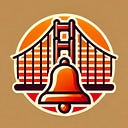Member-only story
My First Year in Silicon Valley
After spending the previous six years of my life in a tiny town for college and a Midwestern city for work, I moved to take a Software Engineering job at a large Bay Area tech company. Here are my takeaways, one year in.
I’m not entirely sure what I expected moving here. I’m not sure I expected much of anything, truth be told.
The questions that swirled around in my head for so many years were less “what’s it like to work at a big tech company?” and more along the lines of “what would be the coolest unicorn to work for”. In retrospect, that was pretty silly. I was so certain that I wanted to work here that I don’t think I ever thought too much about the important things. Things like company culture or how my coworkers might differ from what I’m used to.
So, this piece is intended for anyone that has not worked for a major tech company in the past. As I noticed things over the last year I scribbled them down as notes to my old self. Here are the answers to the questions I (mostly) never asked ☺️
The format below will be what my old self should/would have been curious about. Previously, I’ve worked at small, medium, and large companies, none of which are known at…
